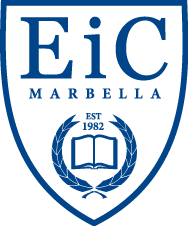
Looking back I think I always wanted to be a “researcher”, some type of detective trying to find the whys, hows and wheres. Science as a whole seemed a natural path, but it could also easily could have been an investigative journalist or a criminal lawyer, few things draw me in more into science: it is fun, it is full of never ending questions, and answers change as experiments become more sophisticated.
When my parents suddenly and without asking, enrolled me in EIC I was not happy. I didn’t speak any English and 14 is not a good age to change friends and school as exams are right round the corner. I struggled with all subjects as I did not understand a word – however the sciences: physics, maths, biology and chemistry, although hard, seemed a bit easier than say English, as the terminology is latin derived and some words where the equivalent to Spanish. A formula is a formula is a formula. When the time came to decide A levels – I chose those which had the most formulas and less narrative, they were also taught by members of the same family – The Sutcliffes.
Chemistry was the best. Not only was I the only student and therefore had lots of attention, but Maria would try to speak in Portuguese to me if I got stuck with the language. Moreover, chemistry was full of mystery – add one component to another et voilá, you could have an explosion, my lab coat was always stained with the most vibrant colours, insoluble organic polymers, dyes and perhaps a burned sleeve from Bunsen burners. The lab would have remnants of the sweet pear smell of esters or if unlucky, the awful odour of H2S.
Unsurprisingly, I went on to study Pharmacy, thinking that my chemistry knowledge would be put to good into developing therapies. Unfortunately, what I liked the most about chemistry i.e. lab work and a dirty lab coat, did not happen in the very theorical university system in Spain. A little bit by chance and desperation, I left for the UK to study microbiology, there was more chemistry in the micro-world than I could ever imagine and my lab coat stayed dirty with methylene blue, crystal violet and india ink. Microbiology led to an interest to study disease and most importantly, how we fight it, how we tolerate our own cells (self-tolerance) and how, sometimes, we don’t (autoimmunity).
After a MSc in Immunology in Imperial College to put myself up to speed, I left to Harvard to do my PhD in an organ which enjoyed what we call “immune privilege” – the eye cornea. If I could figure out, what were those factors that gave privilege to the cornea during say, transplantation, we might be able to translate them to other organs which weren’t so lucky. This concept took me to study immunology in the whole organism and I specialised in autoimmunity for my first postdoc, also in Harvard Medical School. I worked in diseases like rheumatoid arthritis, multiple sclerosis and crucially inflammatory bowel disease, which technically it is not an autoimmune disease but at present we haven’t identified an infectious agent or a specific gene. I came back to the UK to study this disease as a paper came out describing how a set of immune cells could cure intestinal disease in animal models.
I have spent the last 15 years of my career in the University of Oxford doing research in the gut – in diseases such as ulcerative colitis, Crohn’s disease, morbid obesity, colon cancer and primary sclerosing cholangitis. The intestine is like the Wild West in immunological terms and it is a lot of fun to work out what is really going on in a tissue which is in contact with foods, microbes and a plethora of immune cells. I set up and led a biobank of human tissue and became very involved with patient consent and ethics. I led a team of people from several disciplines, technicians, postdocs, students and research nurses. Our biobank became very successful and we had a lot of support from the government and industry as well as from the university.
At the beginning of 2021 I decided to change my career path and I am now winding down my research lab in Oxford and have taken a wider view of science – I have just started to manage a portfolio of therapies mainly for cancer in University College London. The idea is to make these therapies cheaper and available to all. It is challenging and exciting.
In the course of my research career, I myself became a teacher, first in laboratory techniques and then as a lecturer and tutor. I love to see young people excited about science. I have not stopped the teaching, I hold a lectureship and teach the new generation of immunologist. This gives me a good sense of pride and accomplishment. I often think of Maria, patient and fair who made my lessons so fun, and that is what I tell my students: have fun.